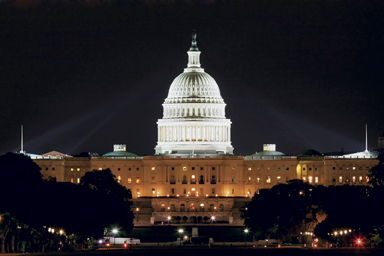Public Policy Analysis & Opinion
Will Congress revive its oversight function and investigate NAIC’s international activities?
In the throes of the 2016 election season, the U.S. House of Representatives passed and forwarded to the U.S. Senate a piece of insurance legislation. Sources close to the legislative effort express confidence in Congress’s taking up the measure again this year.
On May 3, 2016, U.S. Rep. Blaine Luetkemeyer (R-Mo.-03), chairman of the House Financial Services Subcommittee on Housing and Insurance, introduced the Transparent Insurance Standards Act or H.R. 5143. At the time of its introduction, the representative’s office described the bill as being designed to “increase transparency and strengthen Congress’s role in supervising foreign standards-setting organizations.”
The statement provided more detailed insight into the legislation’s purpose. If enacted, the bill would establish a framework before U.S. representatives to the International Association of Insurance Supervisors (IAIS), who are permitted to consent to the adoption of any international insurance standard. The legislation would require the Federal Reserve and the Department of the Treasury to publish a proposed standard in the Federal Register and allow for public comment.
Rep. Luetkemeyer provided a further explanation of his proposal: “I’ve worked with my colleagues to develop legislation that helps to ensure the United States will not only maintain its involvement in international conversations, but will sit at the head of the table. This legislation maintains that international discussions should first and foremost represent the state-based regulatory system and protect American policyholders. The United States has a robust domestic insurance marketplace that puts policyholders first and it is critical that we maintain it.”
In the summer of 2016, the subcommittee chair proved able to fast-track the legislation through an otherwise dysfunctional House of Representatives.
When the Luetkemeyer bill received final consideration by the full committee, Rep. Ed Royce (R-Calif.-39) offered an amendment that directs “the U.S. Government Accountability Office (GAO) to study the involvement of non-governmental designees of state insurance commissioners in international insurance regulation negotiations.” The committee adopted the Royce amendment, which focuses primarily on the international insurance activities of the National Association of Insurance Commissioners (NAIC).
Such activities include NAIC’s direct participation as the representative of the United States on several IAIS bodies and other entities. As Rep. Royce explained: “[T]his amendment seeks to add even more transparency by asking the GAO to report on the activities of outside groups involved in international insurance discussions on behalf of state insurance regulators.”
It will not surprise you that, with an annual budget of $100 million, the National Association of Insurance Commissioners sends more staff to these international meetings than Treasury and the Federal Reserve combined. In fact, staff members of the NAIC chair subcommittees at the IAIS.
MOUs
As the legislation receives consideration for reauthorization in the new congressional session, Rep. Royce and others might want to expand the GAO’s charge. The GAO also should investigate the NAIC’s habit of negotiating treaties with foreign governments. The NAIC calls the agreements Memorandums of Understanding (MOU).
Of course, under the Constitution, neither the NAIC nor any individual state or group of states has the authority to bind treaties with foreign powers. Article II, Section 2 of the Constitution delegates to the president the authority “to make Treaties, provided two-thirds of the Senators present concur.”
The NAIC’s website lists treaties with at least 13 foreign powers or groups of sovereign nations and other jurisdictions. The list includes, but may not be limited to, Bermuda, The People’s Republic of China, Nigeria, Curacao, Taiwan, Thailand, Vietnam, Egypt, (South) Korea, “Latin America,” Brazil, Russia, and Iraq.
Under the Constitution, neither the NAIC nor any individual state or group of states has the authority to bind treaties with foreign powers.
Some of these MOUs attract unique levels of curiosity. For example, the NAIC’s MOU with Egypt carries a date of 2007. At that time the NAIC entered into an agreement with Hosni Mubarak’s regime, which the Egyptian people and army deposed in 2011. The government with which the NAIC entered into an agreement no longer exists.
Innumerable problems exist with this nasty habit that the NAIC picked up during the last 15 years. Those problems touch on the Constitution, federal statutes, and the shady way the NAIC concluded these arrangements. How does the NAIC present itself to foreign governments? Does the NAIC imply that it holds government power or acts as an extension of government bodies? Under the provisions of the McCarran-Ferguson Act, the NAIC cannot receive or wield regulatory authority.
What triggers the need for a faux-official agreement in only certain jurisdictions? Having never witnessed protestors in American streets demanding a more integrated approach to insurance regulatory policy between the U.S. and Curacao, one might wonder who saw their parochial interests served by initiating each of the MOUs.
If one recognizes that the NAIC cannot legally stand in the shoes of state insurance regulators under the McCarran-Ferguson Act, do these MOUs make NAIC a foreign agent? If so, has the NAIC registered as a foreign agent of those jurisdictions listed in the MOUs?
These are not the only questions that linger around the NAIC’s international activities. A GAO investigation could provide Congress and the public vital information as to the motivation and nature behind the NAIC’s shadowy activities in the international sphere. Congress and its investigators should apply some transparency to the NAIC’s treaty-making with foreign sovereign powers.
Russia
The NAIC’s MOU with the Russian regime provides some interesting language for consideration. First, it refers to the parties as “Authorities,” and the NAIC cannot be legally construed as an authority. For some reason the NAIC wishes to present itself as a governmental or quasi-governmental entity. The NAIC does not hold regulatory authority, and the conference report on the McCarran-Ferguson Act, augmented by Supreme Court opinions, prohibits the NAIC from that public charge.
The NAIC’s MOU also asserts that the Delaware-chartered corporation is “acting on behalf of the NAIC members.” Once again, the NAIC cannot take regulatory actions on behalf of state officials. The Constitution delegates jurisdiction over insurance to Congress through the Commerce Clause. Congress lent that authority to the several states—to the extent that the states use it. The states may not transfer the power again.
The NAIC MOU with Russia goes further to suggest that the Delaware-chartered corporation acts as an extension of American state officials’ regulatory activities. The purpose of the MOU: “facilitating the performance of insurance regulatory functions under the respective laws, regulations, and requirements of Russia and the fifty States, the District of Columbia and the U.S. territories.”
Soapsuds?
The GAO also should review the NAIC’s financial records related to international travel. As noted in the June 2013 edition of Rough Notes (Preferred vendor NAIC bestows millions in travel gifts on state officials), the NAIC senior management uses international travel in ways that appear to violate state ethics rules and opinions. Also, GAO investigators should review whether the NAIC still engages in money-laundering transactions that allow insurers or insurers’ associations to pay for international travel for state officials.
Rumors of such nefarious activity surfaced in the late 1990s. At that time, concerns arose over the NAIC’s paying the expenses of a commissioner from a southern state to travel to Japan. The story alleged that a former NAIC staff lawyer negotiated an arrangement whereby the association would pay for the commissioner’s expenses but receive a dollar-for-dollar reimbursement of those expenses from a carriers’ association. Had the carriers’ association made the alleged direct payment of the commissioner’s expenses, the transaction would violate the state’s ethics rules.
These allegations piqued this commentator’s interest. In late 2001, this commentator secured copies of emails, letters, invoices, and checks that documented the transaction and wrote about it in a newsletter.
In an NAIC email dated November 2, 2001, the NAIC executive vice president approved a transaction proposed by an executive for a U.S.-based life insurer that covered travel expenses incurred by the then South Carolina insurance commissioner on a trip to China with the executive. The travel had already occurred; however, the NAIC executive vice president’s email communications suggested that she was not aware of the trip or any NAIC-related business that would send a commissioner to China.
The transaction resulted in the NAIC’s tendering a check for $4,959.60 to a Columbia, South Carolina, travel agency in payment for an invoice applied to the South Carolina Department of Insurance account in the same amount. Also, the transaction called for the insurer to reimburse the NAIC for hotel room charges of $136.26 mistakenly applied to the NAIC master account but generated by the company executive. (He had just passed through the revolving door between the ranks of regulators and regulated.)
On November 9, 2001, the NAIC tendered Check #128745 to a Columbia, South Carolina, travel agency in payment for its Invoice 20011005, issued on October 5, 2001. On December 3, 2001, the NAIC received a check and transmittal letter from the life insurance executive. The cover letter confirms that the check reimbursed the NAIC for the travel and room expenses as agreed to the month before. Oddly enough, the attached check from the insurer (number 8990065340 dated November 28, 2001) ordered payment to “NAIC Publications.”
For too long Congress has shirked its responsibility to provide ongoing oversight of the authority over insurance that it lent to the states in 1945. This observer still believes that the McCarran-Ferguson framework can serve the public interest, but that belief assumes active Congressional oversight.
Congressional action on the Transparent Insurance Standards Act deserves watching.
The author
Kevin P. Hennosy is an insurance writer who specializes in the history and politics of insurance regulation. He began his insurance career in the regulatorycompliance office of Nationwide Insurance Companies and then served as public affairs manager for the National Association of Insurance Commissioners (NAIC). Since leaving the NAIC staff, he has written extensively on insurance regulation and testified before the NAIC as a consumer advocate.






